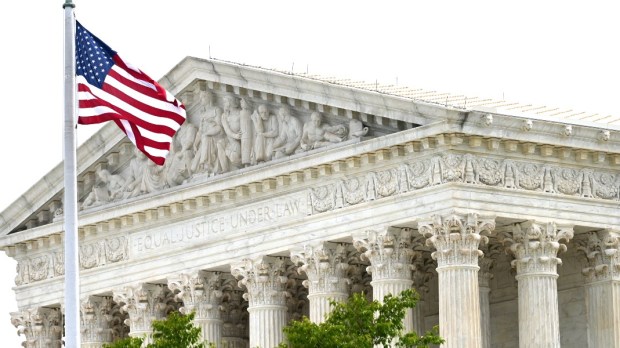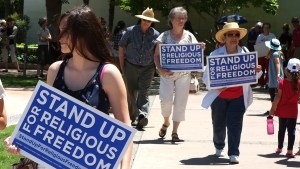In a unanimous decision, the Supreme Court of the United States ruled today that the City of Philadelphia’s decision to not contract with a Catholic adoption agency for the provision of foster care services unless the agency agreed to certify same-sex couples as foster parents is a violation of its religious liberty.
The court ruled 9-0 in Fulton v. City of Philadelphia that the city’s exclusion of Catholic Social Services violates the Free Exercise Clause of the First Amendment.
“I am overjoyed that the Supreme Court recognized the important work of Catholic Social Services and has allowed me to continue fostering children most in need of a loving home,” said foster mom and named plaintiff Sharonell Fulton, in a statement. “My faith is what drives me to care for foster children here in Philadelphia and I thank God the Supreme Court believes that’s a good thing, worthy of protection.”
Fulton has cared for more than 40 foster children over the past 25 years.
As the court explained in its ruling, Philadelphia’s foster care system relies on cooperation between the city and private foster care agencies. The city enters standard annual contracts with the agencies to place children with foster families. One of the responsibilities of the agencies is certifying prospective foster families under state statutory criteria.
Catholic Social Services (CSS) has contracted with Philadelphia to provide foster care services for over 50 years. Because CSS follows Church teaching that marriage is a sacred bond between a man and a woman and believes that certification of prospective foster families is an endorsement of their relationships, it will not certify unmarried couples — regardless of their sexual orientation — or same-sex married couples.
This does not leave same-sex couples out in the cold, the court noted, as other private foster agencies in Philadelphia will certify such couples, and no same-sex couple has sought certification from CSS.
Background
In 2018, a Philadelphia Inquirer story reporting that CSS could not consider prospective foster parents in same-sex marriages prompted calls for investigation. The city ultimately informed CSS that unless it agreed to certify same-sex couples it would no longer refer children to the agency or enter a full foster care contract with it in the future. The city explained that the refusal of CSS to certify same-sex married couples violated both a non-discrimination provision in the agency’s contract with the city as well as the non-discrimination requirements of the citywide Fair Practices Ordinance.
“The city controls where every foster child who comes into the system is placed. They have been refusing to place any more children with Catholic Social Services,” Lori Windham, who argued the case before the Supreme Court, told Aleteia. Windham is senior counsel at the religious liberty law firm Becket.
CSS and three affiliated foster parents filed suit seeking to enjoin the city’s referral freeze on the grounds that the city’s actions violated the Free Exercise and Free Speech Clauses of the First Amendment. The District Court ruled against CSS, and the Court of Appeals for the Third Circuit upheld that decision.
Thursday’s decision reversed the Third Circuit decision and remanded the case for further proceedings consistent with the June 17 opinion.
It said that Philadelphia’s actions “burdened CSS’s religious exercise by forcing it either to curtail its mission or to certify same-sex couples as foster parents in violation of its religious beliefs.”
“Under the circumstances here, the City does not have a compelling interest in refusing to contract with CSS,” the Court wrote. “CSS seeks only an accommodation that will allow it to continue serving the children of Philadelphia in a manner consistent with its religious beliefs; it does not seek to impose those beliefs on anyone else.”
Writing for the Court, Chief Justice John G. Roberts began the opinion by citing the history of the Catholic Church of Philadelphia’s care for the poor. “The Catholic Church has served the needy children of Philadelphia for over two centuries,” Roberts said. “In 1798, a priest in the City organized an association to care for orphans whose parents had died in a yellow fever epidemic. During the 19th century, nuns ran asylums for or- phaned and destitute youth. When criticism of asylums mounted in the Progressive Era, the Church established the Catholic Children’s Bureau to place children in foster homes. Petitioner CSS continues that mission today.”
Roberts also noted that CSS does not object to certifying gay or lesbian individuals as single foster parents or to placing gay and lesbian children.
“For over 50 years, CSS successfully contracted with the City to provide foster care services while holding” to its beliefs about marriage, he added.
A new liberty bell
In a press call arranged by Becket Thursday morning, Archbishop Nelson Perez of the Roman Catholic Archdiocese of Philadelphia, called the decision “a profound one that rings loudly in Philadelphia and reverberates throughout the country.”
“It is a crystal clear affirmation of First Amendment rights for the Archdiocese of Philadelphia and all charitable ministries in the United States who are inspired by their faith to serve the most vulnerable among us,” Archbishop Perez said.
The archbishop said the ruling allows foster families to “find an agency that shares and reflects their faith, and for foster children to find a loving home. It also protects our enshrined right to religious freedom and celebrates the rich diversity of religious beliefs in the United States.”
“It is my personal hope that today’s decision makes it abundantly clear that religious ministries cannot be forced to abandon their beliefs as the price for ministering to those in need,” Perez stated. “We can all live and work peacefully, side-by-side, to create a better and brighter future for all of our children.”
Windham, of the Becket law firm, said in the press call, “The justices recognized that religious social services of many different faiths can come together to serve their communities and that government cannot restrict them or exclude them because of their religious beliefs.”
“The court recognized today that religious freedom extends to the work and service that people do, not just what they do in a … church on Sundays but when they open their doors and go out and serve their community,” Windham added.
Several organizations called the ruling a narrow and limited one that focuses on specific contractual language.
“The ruling leaves intact the broader principle that governments can require contractors, including religious agencies, to comply with nondiscrimination laws — including those that protect same-sex married couples — when providing taxpayer-funded social services,” said GLBTQ Legal Advocates & Defenders (GLAD) in a statement. “While the Court found Philadelphia’s contract with CSS to be unenforceable, it did so because the contract allowed individual discretionary exemptions on a case-by-base basis but would not consider CSS’s claim. The case stemmed from a claim by Catholic Social Services that it should have been allowed to decline to work with same-sex couples when providing foster care placement services under contract with the City of Philadelphia.”
But Windham said the ruling brings “significant clarity to the Free Exercise Clause,” is a “strong layer of protection for religious social service agencies, and it helps governments and religious agencies to know what the rules are and how to apply the law going forward.”
She said the decision “goes into the fact that Philadelphia had a process for making different kinds of individualized exemptions to the rules, and when that is the case, government can’t refuse to protect religious freedom.”
Windham argued that the ruling is not limited to the contracts with Catholic Social Services. “The ruling looks at the wonderful work that foster care agencies are doing and recognizes the importance of that work. So this goes beyond one contractor, one rule, and I would say it goes beyond one city.”
In a separate statement, Carrie Severino, President of Judicial Crisis Network, commented: “Today’s unanimous judgement in Fulton v. City of Philadelphia is yet another resounding victory for religious liberty, and against religious discrimination. This Court is establishing itself as the most protective of religious liberty in history. This follows a string of wins in religious liberty cases, including the COVID church cases, Little Sisters (2020), Espinoza (2020), Our Lady of Guadalupe School (2020), the Bladensberg “Peace Cross” (2019), Masterpiece Cakeshop (2018), Trinity Lutheran (2017), to name a few. Kudos to the Chief Justice here for leading a unanimous Court to this judgement.”



